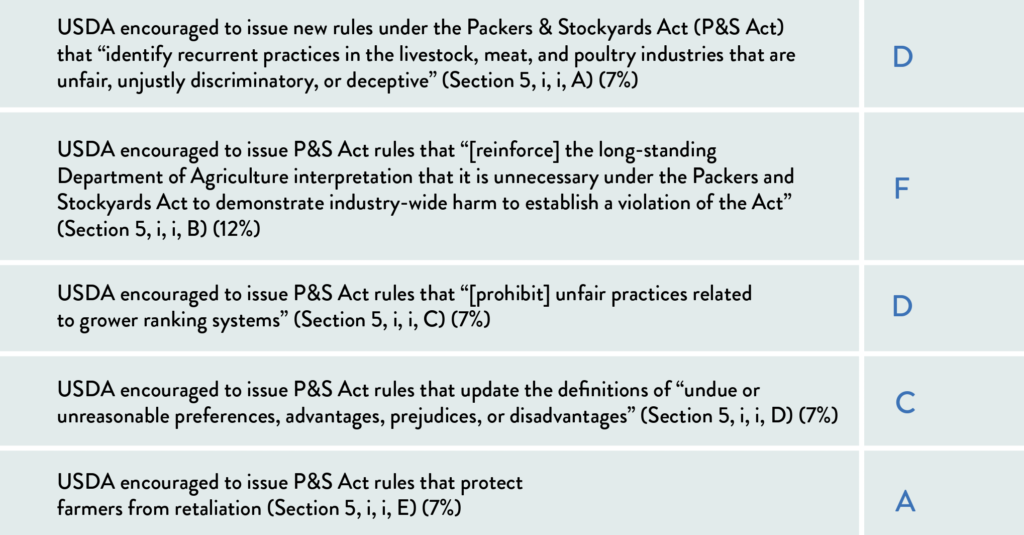Secretary Vilsack Says He Doesn’t Listen to His Critics — Maybe He Should
POLITICO reporter Marcia Brown recently interviewed USDA Secretary Tom Vilsack on the agency’s efforts to promote competition in the agriculture industry — a topic that Farm Action analyzed extensively in our latest report card grading the Administration’s progress on the executive order directives.
When asked about how he responds to those questioning his commitment to taking on Big Ag, Vilsack responded: “People can criticize. I don’t pay any attention to it. My focus is on trying to make sure that small and mid-sized operators have a fair shot.”
That’s a slick response, and it explains Vilsack’s repeated failures across his multiple stints at the helm of USDA. Lacking any farm background, he is merely a politician who’s convinced himself — and importantly, other politicians in D.C. — that he’s the voice of smaller and mid-sized operators. Yet his actions — or lack thereof — are running counter to his words.
Vilsack should take notice that it’s the small and mid-sized farmers who are criticizing him. Maybe he should try listening.
What the Voices From the Countryside Are Saying
Vilsack is quick to pat himself on the back, but those with skin in the game think he needs a wake-up call. Since Vilsack brought his plan to USDA in 2009, we’ve lost countless family farmers, rural communities have been increasingly hollowed out, and the world’s largest agriculture corporations have amassed more power and profits.
POLITICO recently took a deep dive into what America’s producers think of Vilsack’s efforts to increase competition, highlighting our report card’s critique of USDA. Understandably, small-scale producers have grown tired of waiting for USDA to finalize regulations that would help level the playing field for family farmers and small businesses, including critical rulemakings to strengthen the Packers and Stockyards Act.
As we discussed in our report card, only one of the five Packers and Stockyards-related directives in President Biden’s executive order to increase competition has been addressed thus far.
Jake Davis, a Missouri farmer and advocate for antimonopoly policy, said that “folks have just been dismayed honestly at [USDA’s] pace…There’s some — or more than some — skepticism about intent.”
Chris Petersen, an independent Iowa hog farmer and former president of the Iowa Farmers Union, said Vilsack is “doing a little bit here and there but my message to all them guys, including Vilsack, is: ‘Rome’s burning, guys, we’re disappearing’…Approximately 92 percent of independent pig farmers are gone and the infrastructure for that type of agriculture is going and a lot of it is gone already.”
The message from America’s farmers is clear: USDA isn’t doing enough to help family farmers. It must act on meaningful system reform, and time is running out. But Vilsack has other priorities in mind.
Vilsack’s Solution to Food System Consolidation: All Carrot, No Stick
As a big government politician, it’s no surprise that Vilsack’s solution to our consolidated food system crisis is to throw money at the problem. He’s hoping to spend his way into building market opportunities — which is a critical component of competition reform — but it’s just one part of it. For these investments to work, USDA must also remove power from the multinational corporations that have a stranglehold on our food system — otherwise, this money is just going down a rat hole.
For example, USDA’s investments to support small and mid-size meat processing plants competing with major meatpackers like Tyson and JBS are an important step — but without simultaneously taking aggressive action to rein in corporate monopoly power through fair competition rules, these investments will fail because the largest companies will buy out smaller competitors.
Vilsack is an intelligent politician. He knows that only throwing money at the problem won’t actually fix it. His sidestep of the real issue — concentration — is just a Slick Willie move by a slick politician. So he puts the stick aside, gives the carrot, and tells you he’s doing his job.
Vilsack Is Reinforcing Corporate Control of Our Food System
Vilsack is shielding our food system from meaningful reform and is propping up the sector’s most powerful corporations.
His vision for a fair food system is reliant on creating “more, new, and better markets,” yet some of these new markets only stand to benefit industrialized production models. Take for example the biogas market, which Vilsack cites as a new market opportunity for producers. The practice of using methane digesters — which decompose the massive amounts of animal waste from industrial farms to create “biogas” — only further props up this failed system.
And if Vilsack aims to expand markets for small and mid-sized producers, one must question his opposition to California’s Proposition 12 — a provision that would benefit small and mid-size hog farmers across the country who have chosen not to use gestation crates. Vilsack’s stance on Prop 12 positions him squarely on the side of the largest multinational pork producers like Smithfield Foods, who are pushing the EATS (Ending Agricultural Trade Suppression) Act through Congress to overturn Prop 12 and countless other state and local laws.
Vilsack also loves any opportunity to brag on his procurement policies, glossing over his defense of the government’s continued federal contracts with Brazilian meat giant JBS after its owners engaged in widespread criminal conduct. The justification for these continued contracts, as he said, is that there are too few competitors in the sector. Instead of throwing his hands in the air and going along with JBS’ meat monopoly, he should use this opportunity to support independent farmers through federal procurement programs.
And finally, USDA’s “Partnerships for Climate-Smart Commodities” is another example of the agency’s corporate empowerment masquerading as a hand up for family farmers. The program claims it supports “a diverse range of farmers, ranchers, and private forest landowners… and provide[s] direct, meaningful benefits to production agriculture, including for small and underserved producers.” USDA invested more than $3.1 billion in 141 “Climate-Smart” projects — and the lion’s share of funding was awarded to the largest, most harmful players in the food industry like JBS, Tyson, and Coca-Cola.
Vilsack was right when he said he doesn’t listen to his critics — producers across the country know he’s not interested in listening to them. It’s Big Ag’s Washington lobbyists that are bending Vilsack’s ear, and he has repeatedly proved that he is more than happy to oblige.
Written and edited by: Jessica Cusworth, Angela Huffman, Dee Laninga, Christian Lovell, and Joe Maxwell. Concept by: Angela Huffman and Joe Maxwell.



